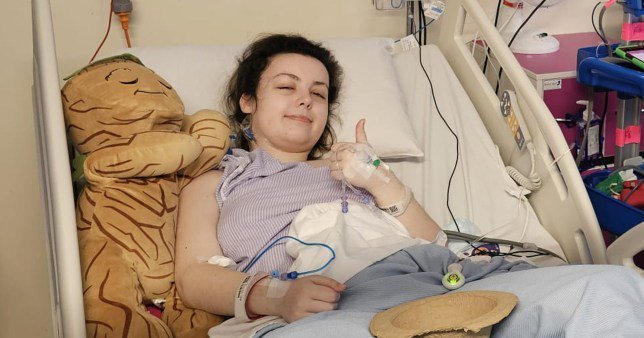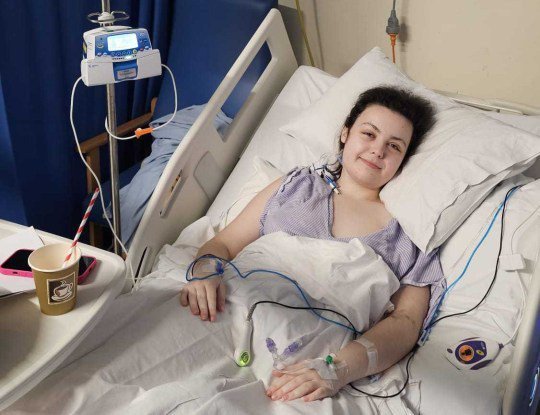
Imali took two years to be diagnosed with severe ulcerative colitis. She recalls her experience when she went to the emergency room.
When the doctor asked her why she was there, she said, “I’m bleeding from my bottom when I go to the bathroom, and I don’t think that’s normal.” She felt scared and embarrassed.
It was 2021, and she was 20 years old. At first, she thought the blood was related to her Ehlers-Danlos Syndrome (EDS), which makes her skin tear easily. But as her symptoms got worse, she knew something was wrong. With a long wait for her regular doctor, she felt she had no choice but to go to the emergency room.
However, she soon felt like she was wasting the doctor’s time. After two pregnancy tests, the doctor examined her and said, “I can’t see or feel any hemorrhoids, but I think that’s all it is.” He added that hemorrhoids are “typical” for someone her age.
He dismissed her, saying that if her symptoms continued for a year, then she could have further tests. He insisted she was “far too young” for anything serious. Imali felt like she had wasted everyone’s time, so she tried to carry on with her life, but the bleeding didn’t stop.

Imali felt a huge relief when she finally learned that her pain was real and not in her head. It took her two years to be diagnosed with severe ulcerative colitis, also known as IBD, which meant her large intestine was seriously inflamed.
Despite telling doctors many times that something was wrong, she felt ignored and dismissed. It was frustrating because it seemed like no one believed her, and it nearly cost her life more than once.
Imali has always had a sensitive stomach. When she was little, she sometimes wouldn’t go to the bathroom for days, then suddenly she’d struggle to hold it in. Her symptoms improved during her teenage years, but in 2020, when she was 19, they returned and got worse.
After the emergency doctor dismissed her concerns, she tried to ignore her symptoms, but she kept bleeding. By the end of 2021, she was having serious bowel issues and accidents, along with stomach cramps.
At night, she would wake up urgently needing to go to the bathroom, feeling like she had no control. At just 23 years old, she was stuck at home wearing adult diapers.
Her condition affected everything—she couldn’t sleep, eat, or socialize; it took over her life. Throughout her journey to get diagnosed, doctors kept saying she was “too young to be sick” and that bad things don’t happen to people her age.

After pushing for help, in April 2023, Imali’s doctor finally agreed to run some tests. At first, they were checking for cancer, but then they also looked for bowel disorders. The test results showed severe inflammation in her stool, so she had a CT scan.
The doctors told her, “You have extremely severe ulcerative colitis—your entire colon is ulcerated and inflamed.” They explained that normally they can’t see this clearly on a CT scan, but hers “lit up like a Christmas tree.” Imali felt a huge relief knowing her pain was real and not just in her head.
She was immediately put on steroids and received iron infusions because she was anemic from bleeding for so long. For months, she had to gradually lower her steroid doses. While the steroids didn’t heal her bowel, they helped relieve her symptoms.

Imali had a large incision in her abdomen, going from her ribs down to her belly button. Each time she started to feel better, doctors would try to reduce her medication, and she would get sick again.
After six months of this without improvement, she decided to get a second opinion. The new doctors quickly confirmed that she had a severe case of inflammatory bowel disease (IBD) and needed stronger medications called immunosuppressants.
These drugs are similar to chemotherapy and caused her hair to fall out and her skin to worsen. Doctors kept saying the medicine would start to work “after the next dose,” but she became so ill that she never got that next dose.
In February 2024, Imali thought she had a winter bug but ended up with non-stop vomiting and diarrhea for over three weeks. She went to the emergency room, thinking she’d just need fluids and nutrition and would be fine after one night.
But when she arrived, doctors found her heart rate was dangerously high—170 beats per minute. A doctor warned her she was at risk of a heart attack. She was quickly taken to resuscitation, where a team worked to stabilize her heart. Hours later, they managed to get it back to a safe rhythm.
After that, she spent a lot of time in the hospital. During an internal exam, doctors discovered that her colon was completely damaged and nearly tearing itself apart.
They gave her high doses of immunosuppressants and a type of drug called a JAK inhibitor, which was the last option to see if her bowel could heal. Unfortunately, the medication started coming out whole in the toilet because her body wasn’t absorbing anything.
Three weeks into her hospital stay, she lay in bed wondering if she would ever be able to eat again.

Imali doesn’t regret having her stoma surgery, but she wishes doctors had believed her sooner about her health issues.
After her surgery, she experienced a popping feeling in her side and had to run to the bathroom many times, which turned out to be a sign that her colon had perforated and she developed sepsis. She remembers feeling extremely hot and shivering, in a lot of pain, and desperately calling for help.
One day, in so much agony, she dragged herself to the nurses’ station to get attention from a surgeon. Finally, they took her into surgery, and she woke up about six hours later in a special care unit. Because it was an emergency, the doctors had to make a long cut from her ribs down to her belly button.
After the surgery, she had two stoma bags: one for waste and another for mucus from the remaining part of her colon. Recovery was slow, and she spent ten days in the hospital. Once she could start moving around, she began to feel better.
Imali worked hard to accept her stoma, knowing it was necessary for her to survive. At first, it was difficult to adjust, but now it’s become a normal part of her life.
Just two weeks after leaving the hospital, she could eat out at restaurants and visit friends without worrying about accidents. She feels much closer to being herself again, but she’s not fully there yet.
She was frustrated that it took so long for her to get help just because of her age, with people thinking young people can’t be sick.
Imali encourages others to speak up if they feel something is wrong with their bodies. She believes her experience should be a reminder that everyone deserves to be taken seriously when they seek help.


